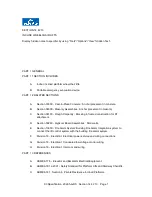
Tiga User Manual
UM-Tiga-017-US
Tiga User Manual |
7
Safety Summary
Safety Summary Continued
•
Anti-tip tubes should prevent the chair tipping over
backwards unintentionally. Under no circumstances
should they take the place of transit wheels, and be
used to transport a person in a wheelchair with the rear
wheels removed.
•
With extreme settings (e.g. rear wheels in the most
forward position) and less than perfect posture, the
wheelchair may tip over even on a level surface.
•
Do not hang heavy items such as shopping bags or
backpacks, on the push handles, head rest or backrest
of the wheelchair. These can change the tipping point
and there is a risk of tipping backwards.
•
When reaching for objects which are in front of, to the
side or behind the wheelchair, make sure that you do
not lean too far out of the wheelchair. If you do it can
change the centre of gravity there is a risk of tipping or
rolling over.
•
Only use your wheelchair properly. For example, avoid
travelling against an obstacle without braking (step,
kerb edge) or dropping down gaps, or using escalators.
•
Only attempt stairs with the help of an attendant. There
is equipment available to help you, e.g. climbing ramps
or lifts, please use them. If there is no such equipment
available, then the wheelchair must be tipped and
pushed over the steps (2 helpers).
•
In general, any anti-tip tubes fitted must be set
beforehand, so that they cannot touch the steps, as
otherwise this could lead to a serious fall. Afterwards
the anti-tip tubes must be set back to their correct
position.
•
Make sure that the attendant only holds the wheelchair
using securely mounted parts (e.g. not on the footrests
or the side guards).
•
When using the lifting ramp make sure that the anti-tip
tubes fitted are positioned outside the danger area.
•
Secure your wheelchair on uneven ground or when
transferring (e.g. into a car) by using the wheel locks.
•
The wheel locks will only work if there is sufficient tyre
pressure and if the correct setting has been made (see
the Chapter on “Wheel locks”).
•
The wheel locks are not intended to brake your
wheelchair. They are only there to ensure that your
wheelchair does not begin rolling unintentionally. When
you stop on uneven ground, you should always use the
wheel locks to prevent such rolling. Always apply both
wheel locks; otherwise, your wheelchair could tip over.
•
The wheel locks have not been designed to be used as
brakes for a moving wheelchair.
•
Always make use of elevators and ramps. If these are not
available, you should request the help of an attendant.
They should only grip the wheelchair at securely
mounted parts. If anti-tip tubes are fitted these must be
folded away. A wheelchair should never be lifted with an
occupant; it should only be pushed.
•
If the seat and back sling are damaged, you must replace
them immediately.
•
Do not lift or carry the wheelchair by the back tubes or
the push handles.
•
Be careful with fire, in particular with burning cigarettes.
Seat and back slings can be set alight.
•
Always make sure that the quick-release axles on the rear
wheels are set properly and are locked in place. If the
button on the quick-release axle is not pressed in, the
rear wheel cannot be removed.
•
In particular when using lightweight metal hand rims,
fingers will easily become hot when braking from a high
speed or on long inclines.
•
If the wheelchair is subject to direct sunlight for a long
period of time, then parts of the wheelchair (e.g. frame,
leg rests, brakes and side guards) may become hot
(>41°C).
•
To avoid hand injuries do not grab in between the spokes
or between the rear wheel and wheel lock when driving
the wheelchair.
•
Do not use the wheelchair on slopes > 5°.
•
The dynamic safe slope is dependent on the chair
configuration, the user’s abilities and the style of riding.
As the user’s abilities and style of riding cannot be
pre-determined then the max safe slope cannot be
determined. Therefore, this must be determined by
the user with the assistance of an attendant to prevent
tipping. It is strongly recommended that inexperienced
users have anti-tips fitted.
•
Do not use your wheelchair on muddy or icy ground.
•
Do not use your wheelchair where pedestrians are not
allowed.
•
The wheelchair should be used with caution in heavy
rain, snow, slippery, or unsound surfaces.
•
Do not use the wheelchair in hazardous environments.
•
When it is dark, please wear light clothing or clothing
with reflectors, so that you can be seen more easily.
Make sure that the reflectors on the side and back
of the wheelchair are clearly visible. We would also
recommend that you fit an active light.
•
Adjustments to your wheelchair, especially to security-
relevant components as for example wheel-locks,
anti-tip or backrest must be performed by authorized
dealers.
•
It is recommended to clean and disinfect the entire
product, especially the upholstery, frequently.
•
Do not tilt the wheelchair without assistance
•
Do not reuse single use fasteners








































